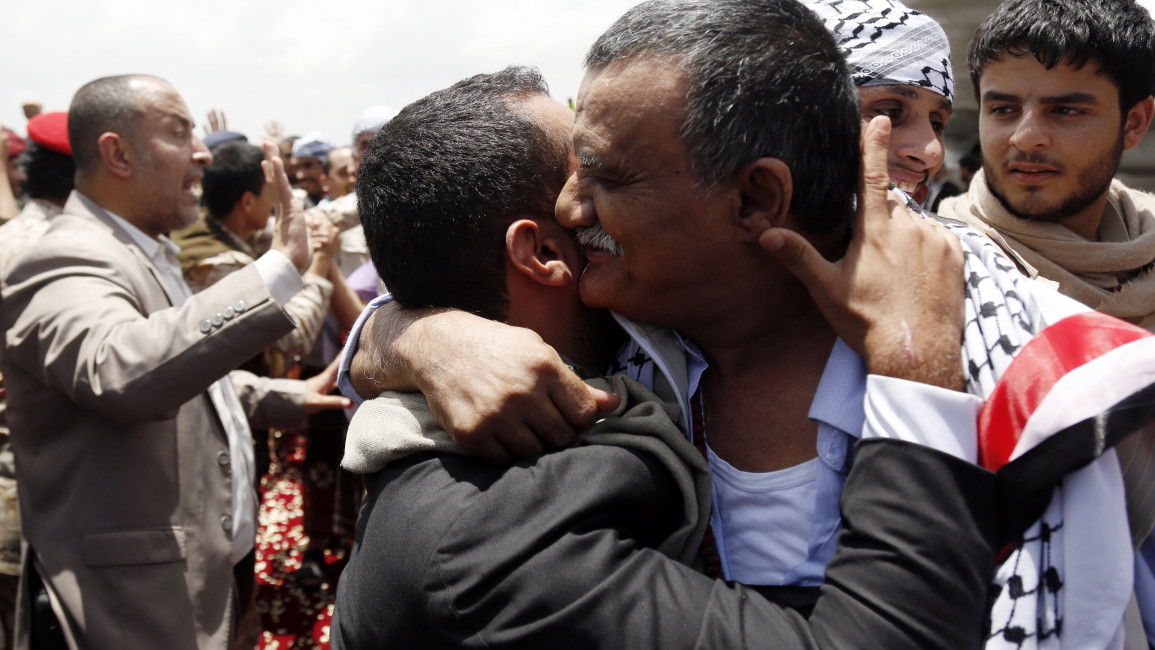Saudis, Sudanese among scores of Yemen war prisoners freed on day two of swap
Scores of prisoners of war, including Saudis, were freed on Saturday as part of a cross-border exchange between a Saudi-led military coalition and Yemen's Iran-backed Houthi rebels, the International Committee of the Red Cross said.
The flights connecting Saudi Arabia and Houthi-held territory in Yemen were part of a multi-day transfer involving nearly 900 detainees that comes amid peace talks which have raised hopes for an end to Yemen's eight-year-old war.
The first flight of the day took off from the southern Saudi city of Abha before 9am (0600 GMT), headed for Yemen's Houthi-held capital Sanaa with 120 Houthi rebel prisoners, ICRC public affairs and media adviser Jessica Moussan said.
|
It was followed by a flight from Sanaa carrying 20 former detainees, among them 16 Saudis and three Sudanese.
Sudan is part of the Saudi-led coalition and has provided ground troops for the fighting.
In addition, 100 Houthis were due to be flown on three flights to Sanaa from Mokha on the Red Sea coast, a town held by Yemen's coalition-backed government.
An AFP journalist in Abha said at least three buses brought the prisoners onto the tarmac at Abha airport, which has previously come under attack from Houthi drones and missiles.
Wheelchairs were positioned near the buses to take some of the prisoners to the plane.
On Friday, 318 prisoners were transported on four flights between government-controlled Aden and Sanaa, reuniting with their families ahead of next week's Muslim holiday of Eid al-Fitr.
The total number of prisoners of war on both sides is unknown.
The ongoing exchange is a confidence-building measure coinciding with an intense diplomatic push to end Yemen's war, which has left hundreds of thousands dead from the fighting as well as knock-on effects like food insecurity and lack of access to health care.
Analysts say that eight years after mobilising a coalition to crush the Houthis, the Saudis have come to terms with the fact that this goal will not be met and are looking to wind down their military engagement.
Crown Prince Mohammed bin Salman, who was a 29-year-old defence minister when the war began, has since become the kingdom's de facto ruler and is keen to focus on his sweeping "Vision 2030" domestic reform agenda.
The Saudi exit strategy appears to have taken new impetus from a landmark rapprochement deal announced with Iran last month.
The China-brokered agreement calls for the Middle East heavyweights to fully restore diplomatic ties following a seven-year rupture, and has the potential to remake regional ties.
Saudi Arabia is also pushing for the reintegration into the Arab League of Iran ally Syria, more than a decade after its suspension over President Bashar al-Assad's brutal crackdown on pro-democracy protests.
On Friday, the kingdom, which once openly championed Assad's ouster, hosted top diplomats from eight other Arab countries in the Red Sea city of Jeddah for talks on Syria, then issued a statement highlighting the "importance of having an Arab leadership role in efforts to end the crisis".
In Yemen, active combat has reduced over the past year following a UN-brokered truce that officially lapsed in October but has largely held.
A week ago, a Saudi delegation travelled to Sanaa, held by the Houthis since 2014, for talks aimed at reviving the truce and laying the groundwork for a more durable ceasefire.
The delegation, led by ambassador Mohammed al-Jaber, left Sanaa late on Thursday without a finalised truce but with plans for more talks, according to Houthi and Yemeni government sources.
Even if Saudi Arabia manages to negotiate a way out of the war, fighting could flare up again among the different Yemeni factions.
"Saudi Arabia has been struggling to draw down its military involvement in Yemen and... seeks a long term sustainable peace that will allow it to focus on its economic priorities," Sanam Vakil, director of the Middle East and North Africa Programme at Chatham House, told AFP.
"Yet despite its intention, it will be the longtime broker, investor and conflict guarantor of Yemen."



